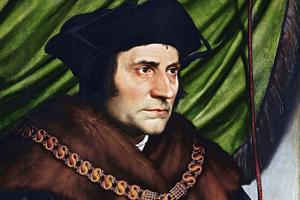Speaking Truth to Power — Sts. Thomas More and John Fisher
The resistance of St. Thomas More and St. John Fisher to Henry VIII is a model for today

When Henry VIII demanded that he be permitted to divorce Catherine of Aragon so that he could marry again, John Fisher and Thomas More refused to relinquish their convictions — even though it meant losing their lives. They stand as models for courage in the current era.
Judge Robert Conrad had spent his adult life admiring Thomas More. He had developed a growing admiration for John Fisher. And Conrad, district court judge for western North Carolina, couldn’t help but notice — as he learned more about the two saints who sacrificed their lives for the sake of personal integrity — that there were many ways in which the “political correctness” of 16th-century England is repeated today in America’s “cancel culture.”
Judge Conrad delineates those striking similarities in some detail in his new book, John Fisher and Thomas More: Keeping Their Souls While Losing Their Heads. Conrad talked recently with the Register about how More and Fisher serve as inspiration for modern-day lawyers, for his own children, and for all Catholics.
“What struck me as I dug into their lives,” Conrad said, “is how on the surface, the 16th century is very different from the 21st century; but if you peel back the layers, there are strong similarities.”
Conrad itemized some of the ways the British saints and lawyers inspired him, and how their stories could inspire people still today:
Their courageous speaking truth to power. Thomas More and John Fisher felt compelled to follow their consciences and to stand in opposition to King Henry VIII’s intended divorce, regardless of the consequences — even knowing that the likely consequence would be death by beheading.
They demonstrated a strong concern for religious freedom.
They sensed that an oath — someone’s word — was a serious thing, which perhaps wasn’t taken seriously enough by the culture in which they lived.
They faced a pandemic. Today the world struggles with the widespread incidence of COVID-19; in 16th-century England, nearly 20,000 people in London and the nearby regions died of the plague.
There were riots in the streets. America’s George Floyd riots and recent protests are nothing in comparison to the Wyatt’s Rebellion or other protests in medieval England, which often were directed against Catholics.
Both in the modern era and in 16th-century Britain, statues have been toppled. In America today, statues of perceived racists have been attacked and some sacred images have been defaced. During the Protestant Reformation, reformers mistakenly believed that worshipers focused on images of Christ, rather than on Christ himself, and iconoclasts stripped Catholic churches and monasteries bare.
Thomas More, canonized by Pope Pius XII and declared by Pope John Paul II the patron of statesmen and politicians, declared while on the scaffold that he died “the king’s good servant, and God’s first.” Likewise John Fisher, English bishop and chancellor of the University of Cambridge, met death with a calm and dignified courage.
I especially appreciated Robert Conrad’s book because it was important and well-constructed, yet eminently readable. Albert Einstein is reported to have said, “Smart people simplify things” — and indeed, in John Fisher and Thomas More: Keeping Their Souls While Losing Their Heads, Judge Conrad avoids the pitfall of heavy academic prose. Instead, Conrad has exemplified Aristotle’s rhetorical triangle, producing a work that appeals to the reader through logos (reason), ethos (character) and pathos (emotions and the sympathetic imagination).
Judge Conrad was pleased to report that publication of the book has opened doors, permitting him to speak freely about historical events, about contemporary culture and about his Catholic faith. He has been invited to speak to various groups; recently, for example, he talked about More and Fisher on a podcast for DUI lawyers. On Feb. 24, he will address the fledgling Veritas Catholic Information Center in Greenville, South Carolina. And just last week, he spoke to a book club in Charleston via Zoom. “Most of the people in that group were not Catholic,” he reported, and yet readers and listeners have responded positively to the story of the Catholic martyrs’ strong faith. One person asked him directly, “Well, I don’t believe in an omniscient being like you all seem to believe in — so what lessons could I learn?”
Indeed, Judge Conrad said, there are lessons to be learned from Sts. John Fisher and Thomas More — lessons that apply to believers and unbelievers alike. Whether confronting a government official who supports abortion, or countering unreasonable claims from the cancel culture, More’s and Fisher’s examples of fidelity to a well-formed conscience will inspire and empower the reader to go and do likewise.
The early response to the book has been most favorable: Mary Eberstadt called it “the most inspiring book I’ve read in years.” Former Attorney General John Ashcroft warned, “Don’t read this unless you are prepared, first to be intimidated by the lives of focused virtue; and then inspired with God’s help to imitate them.”
- Keywords:
- st. thomas more
- st. john fisher

















